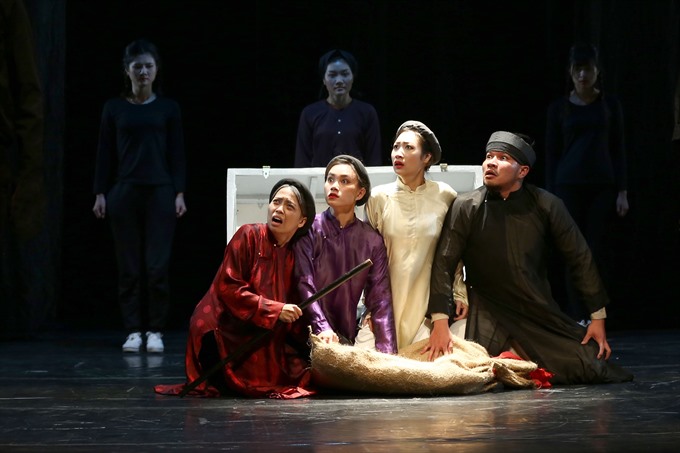 Features
Features

Trần Lực returned to a very different Việt Nam after studying in Bulgaria for several years, and made his mark as an actor, a TV film producer and a teacher. It was only 30 years into his career that he brought out the deep passion he has for theatre, with a trail-blazing, award-winning comedy, reports Nguyễn Thúy Bình
 |
| Transfixed: A scene from Quẫn, a comedy that is the first stage production by actor and director Trần Lực in his 30 year-career. Photo Nguyễn Thúy Bình |
"Excited youngsters tap their toes and clap their hands along with the rap performance of leading actor on the Việt Nam Youth Theatre’s stage. Meanwhile, older spectators are quiet, not quite sure what is happening on the stage.”
Director Trần Lực commented on the audience who watched the very first play he has staged.
The comedy, Quẫn (Stupefaction), is a notable work that can be considered representative of modern Vietnamese theatre.
Lực staged the comedy for fourth-year students at the Hà Nội Academy of Theatre and Cinema.
"I set up the comedy to give my students a chance to access expressionism on stage. It is my favourite style and I want my students to learn different theatrical styles."
The comedy was written by late dramatist Lộng Chương in 1960. The story is of an upper middle class man, Đại Cát, and his family’s efforts to disperse and hide their wealth after they are ordered to hand over their property to the new government.
Đại Cát aims to get around the issue by giving his daughter a dowry and giving some property away to his wife. His younger sister Đại Hưng also wants to have a part of the big property and incites the mother to take her part.
However, the daughter knows what her father’s trying to do and doesn’t agree with him. With her nursemaid’s help, she finds out where her father hides his gold and takes all of it to the authorities.
Lực said he had to adjust the original script in which the late dramatist aims to criticise and mock the upper middle class.
"I think the original script no longer suits our time," he said. "The playwright’s intention is to enlighten the upper middle class members to follow the new government. But they are human beings and I let them live with their own personalities.
"The comedy helps people learn more about the history of their country. The audience will laugh at the infantile thoughts of older generations. When people laugh, it means that there is a development."
Quẫn earned Lực the Best Director award at Hà Nội Theatre Festival 2016 in December; and the play also won a gold and three silver medals for his actors.
The stage for Quẫn is very simple. There is just one white trunk played at the centre. Sometimes the stage is a living room with a trunk full of gold, sometimes it is a pagoda and at other times a contruction site. A group of actors with black costumes flexibly become workers on a construction site, trees on road or a statue of the Buddha.
Lực gets his leading actors to act with expressionism in “epic theatre”, which is rarely performed in Vietnamese spoken drama.
"German dramatist Bertolt Brecht created a new form of theatre designed to make the audience question and think about what they are watching. It is called ’epic theatre’," Lực explained.
Epic theatre requires great concentration from actors. Actor Trương Mạnh Đạt, who plays the main role, is about 1.80m tall. He is strong enough to act continuously, dancing, singing, speaking and gesturing.
"Western theatre is much influenced by orient theatre such as Japan and China. When I staged Quẫn I wanted to take advantage of Vietnamese traditional art genres of tuồng (classical drama) and chèo (traditional opera). In tuồng, just three actors performing with whips can express the image of thousands of troop riding horses to battle. This is epic theatre," Lực said.
The first Vietnamese spoken drama, Chén Thuốc Độc (A Cup of Poison) by dramatist Vũ Đình Long, is said to have been staged in 1921. For decades after, spoken drama was seen as a preserve of amateurs and intellectuals.
The Việt Nam National Drama Theatre was the first spoken drama troupe to be established in 1952. Most of the plays then used Stanislavski’s "psychological realism".
Quẫn is a break from the predominant tradition.
"Quẫn amazed me. I’m surprised that Trần Lực did this," said People’s Artist Lê Khanh, deputy-director of the Youth Theatre. "I did watch this comedy and I liked it very much. I asked some famed directors to revive it, but they refused. They said it was outdated.”
"It’s great my colleague has done it," said Lê Khanh.
It was not just Lê Khanh, Lực’s father - People’s Artist Trần Bảng - was among the happiest persons to see this comedy at home. The chèo artist could not watch it at the theatre due to old age, so his son recorded the comedy to show him at home.
"I think one of the most important things is that he uses epic theatre to stage the comedy," Bảng said. "He has asked actors to use expressionism on stage. It is something that has not received much attention from Vietnamese directors. Very few directors in the past used it, like Nguyễn Đình Nghi and Đoàn Anh Thắng, but they too focused on stage design, not on acting."
Born to a traditional art family, Lực developed a passion for tuồng and chèo when he was very young. He studied at the Hà Nội Academy of Theatre and Cinema in the mid eighties. As a first-year student, he was sent to study theatre directing in Bulgaria. In the five-year course, he learnt acting as well.
Returning to Việt Nam in 1991, Lực missed out on the introduction of the country’s đổi mới (renewal) process in 1986. It was a very different country he returned to. Adjusting to this and finding his way took some time, so establishing himself in the industry had to be done first, before he could stage his own play.
Lực emerged on the scene after playing the leading role in motion picture Chuyện Tình Bên Dòng Sông (Love Story on the Riverbank) by Đức Hoàn. His good looks and professional acting helped him star in a range of leading roles in many art-house movies including Gánh Hát Rong (Wandering Singing Troupe); and Nguyễn Ái Quốc in Hongkong.
His performances in Chuyện Tình Bên Dòng Sông and Gánh Hát Rong earned him the Best Actor award at the 10th Việt Nam National Film Festival in 1993. He was recognized as a Meritorious Artist in 2001.
While filming in different areas of the country was very useful experience, and he learnt a lot about the art scene in Việt Nam, he was not satisfied being a successful actor with both art and commercial movie success.
In 2002, he ventured into television film production with his own Đông A Studio. His television productions were popular and won several prizes incuding the Silver Lotus at the 11th Việt Nam National Film Festival in 1996 and the Cù Nèo Vàng title - a prestigious award for comedians given by the Tuổi Trẻ newspaper.
Now, into his career for 30 years, Quẫn’s success has pleasantly surprised his colleagues, his family and his audience.
But director Lực also sees it differently.
"The award is meaningful to me and it is unexpected," Lực said. "But the most valuable thing is that I do a comedy in my style and my students have chance to practice. I want to the students to become skillful actors."
In recent years Lực has been teaching acting at the Hà Nội Academy of Theatre and Cinema, where he can transmit his knowledge and love of theatre to the younger generation.
He hopes his first success as director will help him to persist with his own staging style.
"Definitely, I will stage tuồng and chèo because these Vietnamese traditional arts are symbols of epic theatre that I like very much." — VNS




